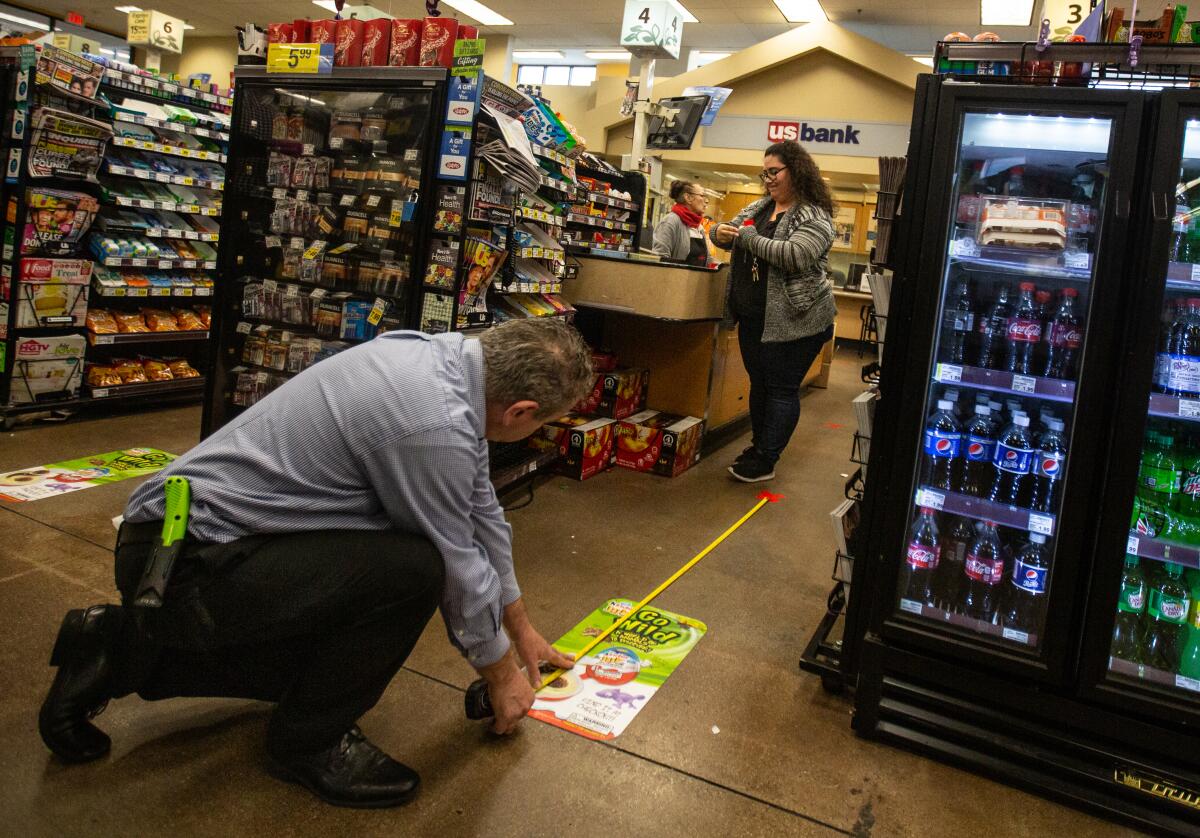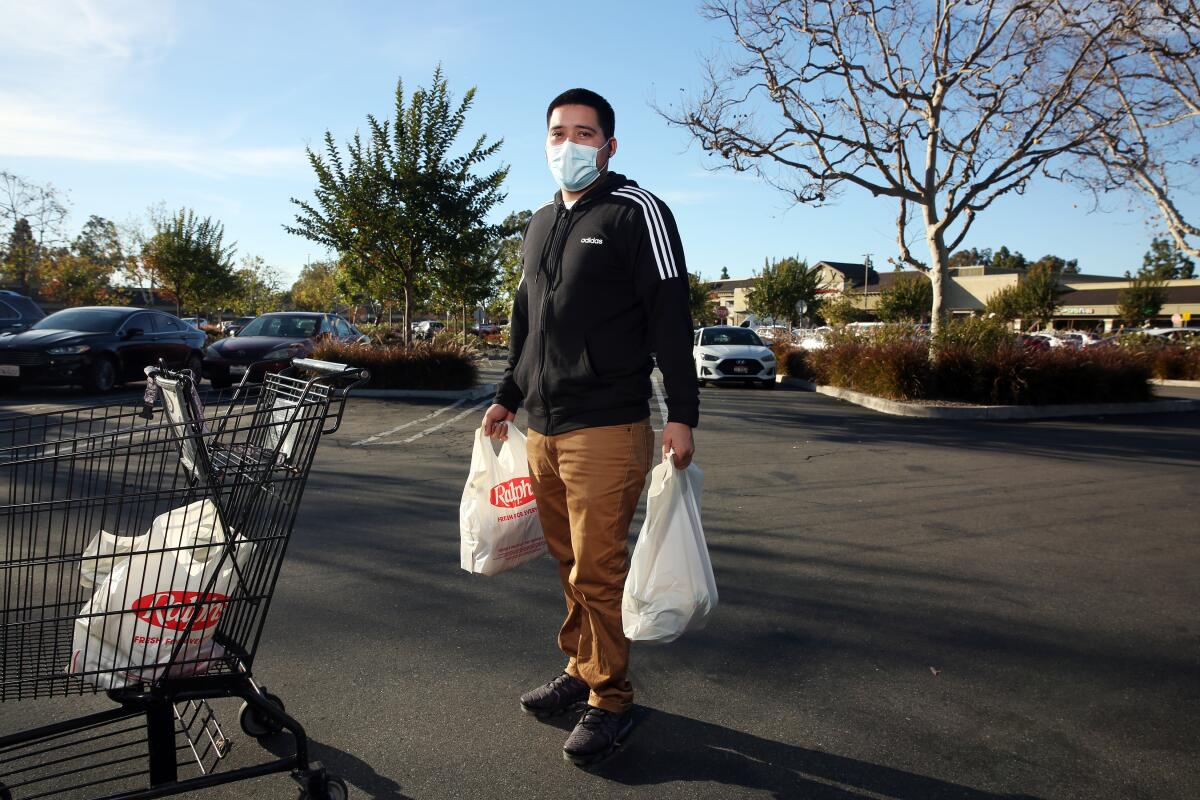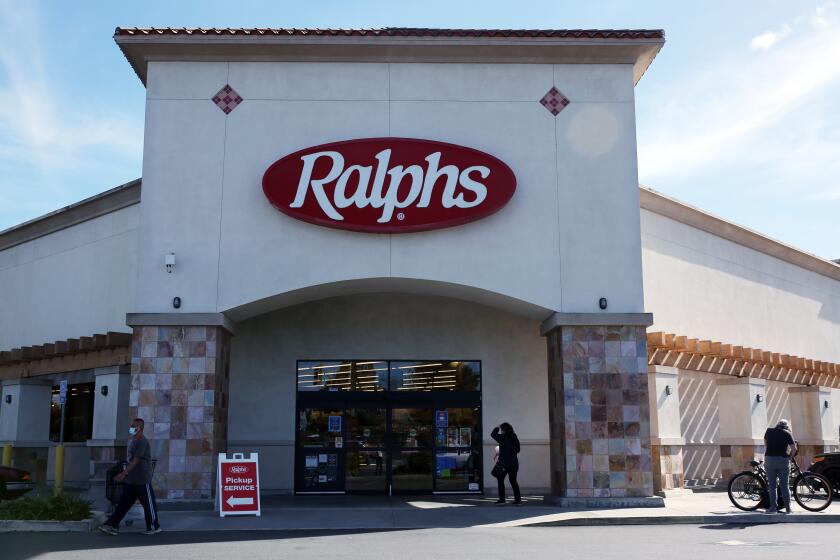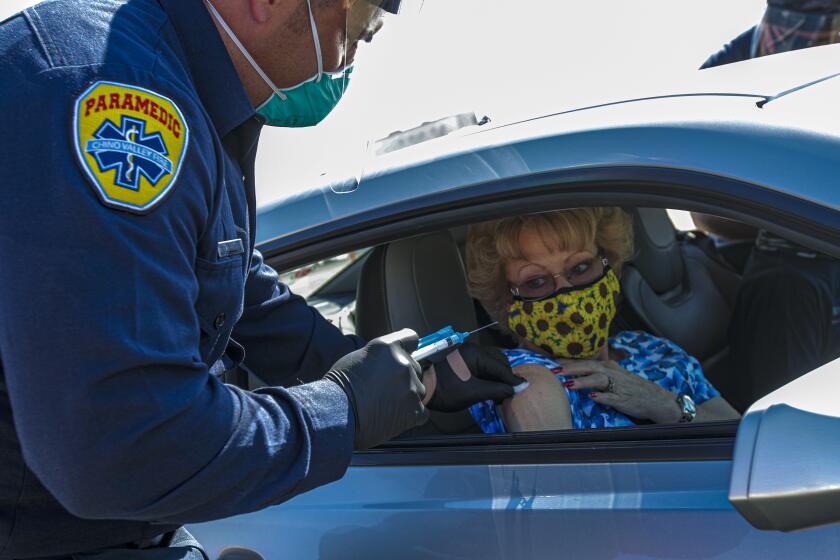Hazard pay for grocery workers gets a big boost from L.A. But big chains are pushing back

Grocery stores, which have served as a lifeline during the pandemic, are now at the center of an increasingly bitter political battle as labor unions and politicians fight to secure hazard pay for workers who have kept the businesses going.
Labor groups scored a victory Tuesday, when Los Angeles became the largest city in the nation to back a proposal requiring grocery stores to temporarily pay workers an extra $5 an hour.
The raises — also called “hero pay” — have become a hot issue in progressive cities in California and beyond, with backers saying grocery workers have put their health at risk to serve customers as COVID-19 has spread. There have been numerous outbreaks at supermarkets and other retailers, with workers getting sick and in some cases spreading the coronavirus to family members.
But grocery owners are fighting back. Following Long Beach’s mandate to pay its workers an extra $4 an hour, grocery giant Kroger announced it would close a Ralphs and a Food 4 Less location in the city.
The California Grocers Assn., which represents about 6,000 stores across the state, filed a lawsuit against Long Beach in federal court.
Seattle and Santa Monica have already moved forward with hazard pay. The L.A. County Board of Supervisors is also expected to vote soon on a similar plan.
The City Council’s unanimous embrace of the pay raise proposal marks another win for labor groups, which previously worked alongside L.A.’s politicians to raise the city’s minimum wage and require larger hotels to pay higher wages.
At the same time, a $1.9-trillion plan unveiled by President Biden last month to tackle the nation’s economic and public health emergencies specifically addressed hazard pay, with the president calling on businesses to provide pay boosts for front-line essential workers, such as grocery and retail staff.
Ahead of Tuesday’s City Council vote to draft a pay-raise ordinance, business leaders warned council members that stores would raise prices and cut pay if the city moved ahead with the wage plan.
Kroger, the owner of Ralphs, Food 4 Less and other retailers, said that it would close two stores in Long Beach in response to city rules mandating an extra $4 an hour in ‘hero pay’ for grocery workers.
Some council members, however, said requiring grocery stores to pay the wage was a matter of economic justice. Others said the chains have seen big profits as people stocked up on food and stayed inside during the pandemic.
“They absolutely can afford this increase,” Councilman Paul Koretz said at Tuesday’s meeting. “They absolutely should be paying this increase. And if they shut down stores, it’s just out of spite. It’s not because they will struggle to survive because they pay their employees a well-deserved $5 an hour extra as hazard pay.”
The decision to close the Ralphs in east Long Beach sparked anger from both employees and customers.
Ivan Love, 23, works as a manager at the Ralphs, one of the stores targeted for closure by Kroger.
Leaning on a cart holding toilet paper and other goods on Tuesday, Love shook his head. With his $17-an-hour wage, Love helps his mother pay rent. He called the decision to shutter the store “unfair” to workers. He got a temporary boost of $2 per hour in the beginning of the pandemic from Kroger, but “COVID never went away.”
As cities went into lockdown and coronavirus cases soared last spring, Kroger was among major chains, including Target, Walmart, CVS, Whole Foods, Costco and Sprouts, that offered bonuses or temporary raises to employees. But less than two months later, Kroger and others stopped the additional pay.
“We never closed down, we never took a break, we never closed early, anything,” Love said. “We’ve been here every day, no matter what.”
David Morales, 22, who was shopping at the Ralphs, said he was shocked by the closure announcement. As a shopper for Instacart, he has noticed a high demand for grocery customers and supports the city’s hero pay ordinance.
“These are essential workers, and during a pandemic, we need those workers, and we need the store to stay open,” he said. “Those $4, it’s nothing extreme. It’s fair.”
Surveying the meat counter, Marlene Ormonde, 76, said grocery workers should “absolutely” get the extra $4 an hour.
“They’re putting their lives out here, too, for these people to come in and shop,” she said. “I don’t know why [the company] wouldn’t want to give them the extra money.”

United Food and Commercial Workers International, which represents 1.3 million workers in grocery, meatpacking, and other front-line industries, is spearheading the pay increase push.
The group is also urging Congress to enact legislation around hazard pay for front-line essential workers and calling on CEOs of major food and retail companies to provide pay boosts.
The cascade of local ordinances around hazard pay in Seattle and several California cities is “just the beginning,” UFCW International President Marc Perrone said in a statement.
Local hazard pay ordinances have already sparked some national changes, with Trader Joe’s hiking its “thank you” premium for workers to $4 an hour on Monday in response to Seattle’s new rules.
Ron Herrera, president of the Los Angeles County Federation of Labor, which represents more than 800,000 workers from over 300 unions, said the council vote Tuesday was an acknowledgement of the risk facing grocery workers.
He called Kroger’s decision to close two stores a “scare tactic” intended to send a message to other states or counties.
The labor federation, which plays a major role in local elections, reached out to City Council members ahead of Tuesday’s vote, Herrera said.
“Certainly it was a campaign, it was a campaign to support workers,” Herrera said.
Under L.A.’s proposal, larger grocery and drug retail stores must provide all hourly, non-managerial workers $5 an hour in addition to their base wage pay for the next 120 days.
The law applies only to grocery and drugstores with 300 or more employees nationally and 10 or more employees on site.
Larger stores that sell groceries, including Walmart and Target, would be included in the ordinance, unlike the Long Beach ordinance, which has received criticism for failing to mandate that the largest grocery retailers, including Target and Walmart, pay the extra $4.
Grocery stores have become highly visible during the pandemic, and it’s no surprise their labor force has become the focus of local legislation, experts said.
As California looks to ramp up immunization efforts, health officials say they hit a stubborn hurdle: the inability to secure a sufficient and reliable stream of COVID-19 vaccine doses.
Burt P. Flickinger III, managing director of the retail consultant Strategic Resource Group, said grocery stores are now the most important destination for food and over-the-counter medicine, due to COVID-related restaurant dining restrictions as well as affordability concerns, with more people cash and credit constrained.
The average person in Southern California went from eating about 10 meals a week at home to eating 17 to 21 meals a week at home in the throes of the pandemic, Flickinger said.
A recent Brookings Institution report that looked at profits at 13 of the largest retail and grocery companies found they had earned an additional $17.7 billion in the first three quarters of 2020 compared with 2019 — a 42% increase.
Even more striking, the country’s three largest grocery providers, Walmart, Kroger and Albertsons, together earned an additional $6.8 billion in profit in the first three quarters of 2020 compared to 2019 — an average increase of 98%.
“The industry is doing extraordinarily well in the pandemic,” said Ken Jacobs, chair of the UC Berkeley Labor Center.
Amardeep Gill, director of the grocery and retail project at the Los Angeles Alliance for a New Economy, said the majority of grocery store workers are women who come from Black, Indigenous and other communities of color, and many are parents.
“Families of color have not been able to shelter in place throughout the pandemic,” Gill said at a council committee hearing last week on the wage proposal. “They were more likely to hold essential jobs and thus face an increased exposure to COVID-19.”
Neil Saunders, an analyst at GlobalData Retail, said hazard pay ordinances such as the one passed by Los Angeles are “quite problematic.”
“It’s very easy to sit in a council chamber and tell someone what you have to pay, because you don’t have to find the money to pay for it,” Saunders said.
Stuart Waldman, president of the Valley Industry and Commerce Assn. said Tuesday’s vote shows the “outsized influence” that labor groups have at City Hall if the council is raising wages during an economic downturn.
He said the Brookings report doesn’t account for how grocery stores are doing this fiscal quarter.
Even if the companies are doing well, “the City Council shouldn’t step in and tell the companies that they should be paying their employees more,” Waldman said. “Especially when there’s a negotiated labor agreement in place.”
The Los Angeles ordinance must return to the council for a final vote.
More to Read
Sign up for Essential California
The most important California stories and recommendations in your inbox every morning.
You may occasionally receive promotional content from the Los Angeles Times.















